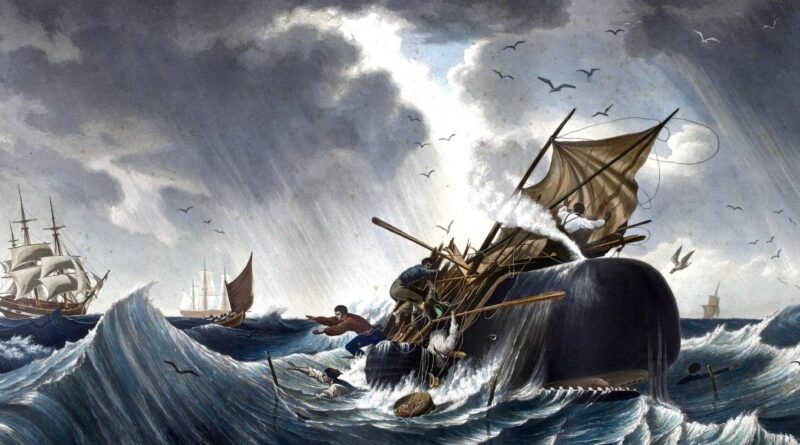How whale investments shaped venture capital in the 1800s
It’s hard to know much about someone born 228 years ago, but we do know a lot about Charles W. Morgan.
A Quaker with five siblings and a brilliant penmanship, Morgan was a partner in a venture capital firm in Philadelphia. And Morgan, born circa 1796, may be the first documented venture capitalist in the United States, a prototype for many of you reading this in 2024.
The Fourth of July is supposed to make us think about where we came from. So, as we leave for the weekend, it seems like a good time to do one of my favorite things in the world: go all the way back to a long-faded beginning. This is exactly what Tom Nicholas does in his excellent book VC: American historywhere he states: The venture capital industry as we know it today has its deepest roots in the whale investments of the 18th and 19th centuries.
Yes, you read that right – real whales, like Herman Melville Moby Dick. Whaling expeditions were risky and expensive, and most expeditions failed. But when they succeeded, it paid off big and made up for the flood of failures.
And although whaling was pioneered by Icelandic and Spanish sailors in the 1500s, Americans dominated it less than a hundred years after the American Revolution. New Englanders were particularly noted for their innovative ship designs, strong talent networks, and appetite for considerable risk: “By about 1850, approximately 75 percent of the 900 registered whaling ships worldwide were American.”
Whaling was terrifying but adventurous, unpredictable but exemplary, risky but highly rewarding. It was also definitely a long distance—if ships were at sea for 18 months, it was an incredibly short journey, and it wasn’t unusual for voyages to last a decade or more. The goal was to trap as many whales as possible for their highly valuable whale oil (extracted from the gland), sperm oil, and whalebone.
The goal was also to come back alive, which was far-fetched—there were many ways to die whaling. You can easily get tuberculosis, dysentery or scurvy. You can be catapulted into the sea while chasing a whale or caught in a raging storm – possibly drowning close to victory. Sailors even died in duels as personal beefs bubbled over the years at sea.
As a result, sailors are VC-backed founders who today (hopefully) aren’t risking life and limb when building their startups. But what might go down on an expedition then is a different flavor of what might go down on a startup now: whale pods were scarce and hard to find, crews could mutiny or desert. explode, and even the most upright-looking expedition could capsize inside. Unpredictably rough weather, but if you were a sailor and returned with your hard-earned whale oil, there was a huge incentive bonus—many sailors and captains had early forms of stock on their voyages. .
And if you think that sounds wild and wonder why anyone would do it at all, consider this: the goal was always astronomical returns, and the numbers show that those were rare but very possible. In this book, Nicholas delightfully juxtaposes historical whaling industry returns with Preqin’s calculations of the net IRR of VC investments between 1981 and 2006. Whaling expeditions yielded zero or less returns, and 32% of VC investments in the data generated zero or negative net IRRs.
But someone had to make it possible for a ship to leave the sea at all, and that’s where Charles W. Morgan, our VC beta, came in. Morgan was known as an agent responsible for long-term financing and organization. Long-term whaling ventures A big part of his work was pattern recognition, so Morgan kept a mountain of logbooks. He followed who was successful and who made the best guesses he could about the best hunting grounds at any given time. Morgan finally had his own fleet (and an eponymous ship).
He was also a stickler for secrecy. As he handed over a notebook full of trade secrets to one of his captains, he also instructed, “This book is placed in your possession with the full understanding that its contents will be held in the utmost confidence and that you You will do it. “It is a matter of honor that none of its contents will be announced.”
An NDA, more or less. Morgan was a prolific documentarian and this makes us know and remember him a little. And as I read through some of his journals, I wondered if, in 200 years, there would be someone like me reading the tweets and notes, and what some of the VCs in particular were doing. Talkers recreate what they did every day during the AI boom of the early 2020s.
And just after Independence Day and at a difficult moment in American politics, it’s strangely good to remember that we have many different kinds of ancestors and even more possible futures.
See you tomorrow,
Allie Garfinkel
twitter: @agarfinks
E-mail: alexandra.garfinkle@fortune.com
Sign up for the Term Sheet newsletter here.
Note: The deals section will be back tomorrow.
#whale #investments #shaped #venture #capital #1800s
